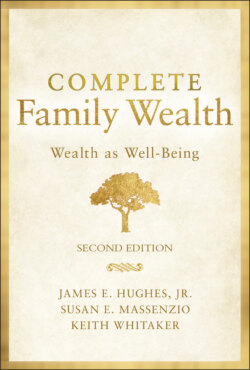Читать книгу Complete Family Wealth - Keith Whitaker, James Hughes E., James E. Hughes Jr. - Страница 39
Active Ownership
ОглавлениеIn addition to keeping the family circle strong, family enterprises need to pay serious attention to the ownership circle. Not doing so is often a crucial failing. Part of the problem is that most people think of ownership as a legal matter. It is. But it is even more a moral matter. The ownership circle is about taking ownership in the sense of taking responsibility, for yourself, your family, and its impact on the world.
FIGURE 2.4 Giving family its place.
Family owners are usually unaware of their responsibilities as owners, unsure about the relationships among their ownership interests, and, indeed, unclear about what they own. As a result, family members tend to be passive owners: they defer on strategic questions to management.
The clearest sign of this challenge is when many family members feel that questions of ownership are taboo or out of bounds.
Families cultivate active owners by making sure that all family member owners understand that:
Ownership is a responsibility; management is a calling.
That said, the enterprise is not “they” or “them” versus the family as “we” or “us.”
Passive ownership leads to paternalism: “Let us take care of you”—as well as resentment: “You should have known better!” Neither bodes well for long-term flourishing.
Managing risk is a complex discipline that every owner must undertake, and the balance between taking too much risk and taking too little risk is one that can be learned and managed. (This point is especially important for family members who are not in business or not investment professionals. Such members often overestimate risk out of the fear of making mistakes.)
Trustees, by their duty of prudence, are entropic owners because they cannot take the same risks as the stakeholder owners of other competing enterprises.
Beneficiaries must step up to be active stakeholder owners. Doing so requires meeting regularly with trustees and asking questions in the effort to learn.
Family owners must possess a basic understanding of systems theory, leadership science, the process of leadership transitions, and methods for assessing the health of the enterprise and the performance of management.
Family owners must communicate with each other and truly listen to each other, to develop their dreams for the enterprise as it evolves beyond the dream of the founder or creator generation.
Family owners must affirm, honor, and express gratitude to their managers, family, and nonfamily. Doing so energizes the system and keeps it vital.
To pursue these activities, it is wise for family owners to hold an owners meeting at least annually. This meeting could also serve as an opportunity to do a check-up on family members' own estate plans, insurance needs, and related financial matters. Management can plan the meeting and curate content, based on appropriate back-and-forth beforehand with family members. Such a meeting may be a good occasion to invite in the family's various advisers to make sure owners have a strong connection with them and know who to call with questions or to learn more.
Family owners should also use the family's resources to attend educational sessions where they can learn how to increase their five forms of qualitative capital.
Young family members learn best by spending time in the family enterprise's operations, whether that is a shop floor, a trading desk, or an office, to experience the family's work and to see the impact that it has on others' lives, too.
A family enterprise faces just a few, critical transitions to manage in each generation, and no short-term transactions are likely to make a comparable difference in the enterprise's success or failure.
Family owners' prime responsibility is to keep their focus, with a beginner's mind, on the strategic level and not succumb to tactical thinking appropriate to short-term problems. The strategic question is not just how to preserve the family's complete wealth but rather how to grow it.
If shared intention or a shared dream provides the overall motivation for the journey of family wealth, then educated, active ownership is the means for pursuing that journey.
